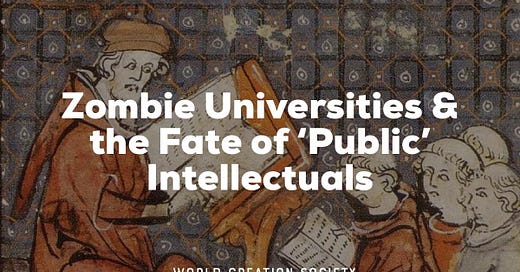Subscribe to World Creation Society to get antidisciplinary insights and reflections on emerging futures at the intersection of technology, society, and culture.
Higher education and research will undergo one of the most significant transformations in the next 15 years.
The idealistic conceptions of intellectual freedom, university education and research will meet the Darwinian demands of the 'Great Market' to transform into new forms.
Big tech will be the new universities, research centres, and R&D venture building platforms.
The top 10% of ‘public’ intellectuals will reap the most significant rewards, becoming the intellectual studio managers, celebrities, philosopher-kings/queens, and more.
The remaining 90% of 'public’ intellectuals will be captured by big tech or create self-sustaining niche communities. Many will operate as the equivalent of Uber drivers in the gig economy.
The top 10% of universities will successfully transform themselves into alternative forms of institutions, no longer having education and credentialling as their primary functions.
The remaining 90% of universities will operate in a zombie state, relying on big tech platforms for survival, with education no longer providing a viable revenue source in the long term.
First Wave vs Second Wave ‘Public’ Intellectuals
The first wave of public intellectuals who joined early in the game are reaping the rewards through existing tech media platforms to gain unprecedented cultural capital and a loyal follower base.
This first wave of public intellectuals will find themselves in two camps. The first are using both their university position and new media platforms to reach a bigger audience. In the second camp are the public intellectuals that exited through their own volition or got cancelled (profiting from the label to get more followers), deciding to operate outside of traditional academia.
In both cases, we’ll see these public intellectuals signing deals with the next big educational media platforms that promise ‘intellectual freedom’ depending on people’s ideological leanings, and handsome financial rewards. Similar to what we see today with Spotify signing deals with podcasters who have large audiences.
Funded by patrons, we see the beginnings of consolidation of new ideological allegiances going through institutionalization to create alternative political and educational schools of thought.
Given the fierce competition in traditional academia and minimal opportunities, many young intellectuals will leap, hoping to have a better outcome.
We’re witnessing the beginning stages of second wave public intellectuals who are using new media platforms to develop courses and content, engaging in activities once reserved for digital marketers and information product entrepreneurs.
The next big educational platforms will soon open the doors for these public intellectuals to offer them better visibility and pay.
They’ll end up being better off outside of traditional academia in the short-term, but the financial rewards will go back to subsistence levels if they find themselves in the wrong niche or can’t compete in the global market.
Niche Indie Intellectuals: Cult Founders, Religious-Ideological Congregations, & The Next Shopify for Education
Indie intellectuals will prefer to operate like hybrids of gild-collectives, offering alternative community-based education and apprenticeship.
They will launch niche online publications, courses, independent research, consulting services, and more—while experimenting with alternative modes of governance.
The next Shopify equivalent monopoly in education will offer easy-to-use customized platforms for indie intellectuals.
Indie intellectuals will initially value less centralized educational platforms, more intellectual freedom, and customization, with many preferring to remain small/medium-sized lifestyle businesses.
The most successful indie intellectuals will consider taking over land in small towns, live in some apartment complex/mansion, or if they’re well backed, build new towns from scratch—all of this for community members across the globe to congregate and live together under shared values and interests. These communities will be testing grounds for new and old political ideologies to emerge.
One can't help but picture Osho's story (Bhagwan Shree Rajneesh), moving his ashram from India to Oregon in 1981. We’ll see some indie intellectuals borrowing from cult playbooks and zen meditation, yoga, farming, or religious retreats, hoping to build a self-sufficient community.
As I write this, there are many building their online communities, and if they reach enough critical mass, some will establish some physical base or chapters across the globe if they haven’t already—once the COVID-19 debacle calms down.
The outcome will be micro-cultural niche communities serving as innovation hotbeds, where entirely new disciplines and ideologies will emerge.
Big Tech: The New Universities & Credentialing Institutions
Big tech is well-positioned to take over the higher education market—going on a shopping spree to acquire all relevant startups—and becoming educational monopolies by default.
Compared to Udemy, Skillshare, Lynda, Big tech will offer higher quality services providing an all-in-one service with enhanced user experience for universities, educators, and students.
At first, FAMGA & co will partner with traditional institutions and Fortune 500 companies. Over time, these universities and corporations will need to depend on them to get a large funnel of students and talent, giving big tech more leverage.
Universities will start strengthening partnerships together to form conglomerates to better pool resources.
Big tech and private donors will increasingly fund universities. We’ll see some universities building their in-house online solutions, but big tech will offer white-label solutions and have a much better and less expensive product.
Big tech will build in-house, acquire, and/or reinforce partnerships with more technical online schools. They will offer ‘educational streams’ not much different from an undergraduate and graduate degree but much better adapted to big tech talent needs, and, you guessed it: with much lower tuition costs.
Many students from all fields will continue to dream of working for these companies, which is a much more direct and less costly path for them than a more general education.
The cherry on top: what’s more enticing than providing financing for the best students to get paid to learn through scholarships and other rewards?
While many innovators are brainstorming complicated AI-generated or blockchain credentialling systems, the solution is much simpler: what better credentialling system than the ones coming from the big tech employers themselves?
These big tech institutions' credibility already has clout and will further be reinforced by associating with Ivey league universities.
The Future of Work in the Big Tech Economy
While these open up opportunities for talent, they will compete globally, which will lower their chances of securing sought after jobs.
You might think this is an evil corp strategy but consider the growing number of students today with no jobs or prospects in sight, forced to take on bullshit jobs with no opportunity for growth, or ending up with skills that are not tailored to the market.
For most of the talent pool, they will no longer have permanent jobs. They will be deployed on various tasks in multiple projects as part of an assembly line, operating as mercenary freelancers.
The norm will be individuals bidding to be assigned tasks, and those with the best skills will win, with no expectations of having any permanent employment.
Some will put together their consulting firms or join one that functions as a talent deployment firm à la human resources platform with higher chances of securing bids with high paying clients.
Big tech companies will continue to roll the red carpet to work with the best talent, whether online or in-person. To win, the big tech monopolies must fiercely battle it out amongst each other to get the best talent.
You’ll see a backlash to these problems by creating more bullshit jobs in traditional institutions, operating like a cancer, making any business or institution even less relevant and unable to compete to offer real value.
The top 10% of the talent pool within these zombie institutions will exit in droves for better opportunities.
Big Tech to Universities: Your Margin is my Opportunity
Big tech will assist traditional institutions by partnering with them to improve their services and reach while opening up the market to access more global talent.
In all cases, throughout this transition, education as we know it will transform into a new remixed form.
Curriculums will be much better adapted to optimize for the whole educational experience by incentivizing instructors to better think of where they fit in the journey when designing courses. The bottlenecks encountered in traditional academia from ineffective bureaucracies can be overcome.
There will also be better incentives to avoid the ‘cramming and forgetting’ strategy of learning and focus more on project-based assignments to build up their portfolios and multidisciplinary skills.
Thanks to personalized education solutions, big tech platforms can adapt to learning based on individual needs and test out new educational frameworks and experiments.
Big tech to universities: ‘your margin is my opportunity.’ They will go along with current universities, but over time, they’ll bring down tuition costs, provide personalized education at scale, and capture more students globally.
While you might think they won’t build the same communities found in universities, consider how powerful it would be for them to match students across the world as a matchmaker given their enormous talent pool and their alumni base growth for every year that passes.
Programs can be divided into smaller communities with a combination of students with different skills and seniority working together as a cohort, and can be deployed on projects within big tech teams throughout their education. You’ll see the apprenticeship model deployed at scale.
As a long-term strategy, big tech will plant seeds early on with parents by providing homeschooling solutions and services for their kids.
Neil deGrasse Tyson Educator-Entertainer Archetype & Hollywood-level Intellectual Studios
Teachers with the best engagement will be rewarded. You’ll see more of the Neil deGrasse Tyson educator-entertainer archetype and the emergence of Hollywood-level production intellectual studios.
Netflix & co will get in the game to produce Hollywood-level educational content as part of the curriculum. Instructional designers will become hybrid video directors and assistants working in film studios.
As you giggle or shriek at this possibility, Scientology initiation videos and high-end narrative marketing will become mainstream—weaving complex narratives to entice students to retain information, while indoctrinating them with their brands throughout the experience.
If you intend to be at the top of the public intellectual landscape, you better learn show business, acting, public speaking, marketing, writing, running your own business—you must be an excellent communicator. If you can amass enough resources with enough disciples, you can launch your intellectual indie studio.
Over time, we’ll see teachers becoming more like one-on-one tutors and instructional designer consultants based on their area of expertise, or focusing more on the thesis-supervisor, researcher, oxford-style tutor apprenticeship role.
Since movie-level lectures are pre-recorded by the best educator-entertainers in the world, there will be a slew of back-end crew in the education production pyramid.
The indie intellectual scenes will be virtue signalling among the hip to demonstrate their refined intellectual tastes and political leanings.
As you’re picturing all of this, there’s never been a better time to develop tools and services that will revolutionize and enhance education.
The New Big Tech Research Centres, Publications, & STEM-Based Ventures
The next educational monopolies will launch the biggest ‘independent’ or hybrid research centres to publish ‘peer-reviewed’ research in all fields. By gradually partnering and taking over traditional institutions, big tech will create new avenues and reforms in research.
The next educational monopolies will have open-source peer-reviewed research for PR points and as a talent acquisition strategy. The best talent will get recruited and deployed for venture creation and secret R&D. Bright researchers will get 10x the rewards by working with big tech rather than universities.
Unlike current peer-review committees for research journals, researchers will get paid to be on those committees, which further reinforces prestige by recruiting the top researchers to give their stamp of approval.
Traditional universities might channel their resources into building lab and research infrastructure, and honing in on graduate education, since undergraduate education may longer be viable. They’ll also serve as a training and production pipeline of STEM researchers who will launch or join high-tech ventures.
Universities might also borrow from the drop-shipping or R&D outsourcing playbook, providing experiment and equipment services for private industry and big tech with a trained research talent pool.
Much like Amazon and industrial factories automating and outsourcing production lines, we’ll see the emergence of automated R&D labs at a scale never seen before—this doesn’t put universities in western countries in a good position.
You’ll also see a better visual transfer of knowledge with enhanced collaboration tools between researchers to increase output, quality, and scale.
Some universities will invest more resources in professions, as these industries are usually slower to change because of regulatory barriers. These professions will transition at a slower rate, but technology is moving at such a rate that the competition will be even more fierce than what it is today. These old monopolies will break down eventually. They will no longer be able to supply the middle-class with a comfortable standard of living.
The Top 10% of ‘Public’ Intellectuals & their Disciples
Where does that leave public intellectuals? Among the top 10%, the top 1% will be pioneers, and the remaining 9% will imitate the pioneers. They will navigate the environment successfully and leverage both traditional and non-traditional opportunities to reap unprecedented rewards.
These top 10% will become celebrity philosopher-kings, queens, entrepreneurs, scientists, politicians, artists, and more.
These public intellectuals will launch the equivalent of ‘music record’ companies or licenses with their brands, recruiting and training disciples to become the next generation of public intellectuals.
The top 10% of public intellectuals will operate like athletes and artists, signing exclusive deals with platforms and firms that give them the most visibility and rewards.
You’ll see public intellectuals-turned-consultants or indie studio managers providing services with their team of disciples. They will collaborate to have actors or disciple-actors teach instead while playing the director or consultant role. You’ll see the American Idol version of intellectual performance auditions.
Prominent public intellectuals will have equity in disciple earnings, becoming angel investors or managing partners/VCs scouting the best talent and offering them Intellectual/Researcher-in-Residence positions with benefits to strengthen acquisition and retention of disciples. These will be similar to how think tanks provide fellowships.
Much like graduate students complaining that they don’t get credit for their work, you’ll hear the same type of complaints of disciples operating under a celebrity intellectual.
The Remaining 90% of ‘Public’ Intellectuals in the Gig Economy
The remaining 90% of public intellectuals will realize that the ‘Great Market’ is an even more vicious Darwinian winner-take-all competition with patron-client and monopoly platforms dictating direction.
These public intellectuals will realize that the ‘intellectual freedom’ promised is not what they had initially imagined. Decentralized possibilities might gain critical mass to exit, but the same dynamics will continue, regardless of centralized or decentralized platforms.
Talking with them in 2025-2035 will sound like any conversation you’ve had with an Uber driver: Uber provided them with the possibility to have their own business working on a ‘flexible’ schedule.
This is usually followed by mentioning that their gig is a short-term way to make ends meet as they figure out their next steps. Ultimately, they end up at subsistence levels.
2020-2030 Higher Education Market Wars & Zombie Universities
Traditional universities that are not part of the ‘luxury brands’ that Ivey League schools enjoy, will be caught with their pants down, unless they radically adapt and change their business models, and/or partner with educational platform monopolies.
This is no easy feat for university executives—they will need visionary leadership to adapt and succeed in this environment. And this transformation will not happen quickly; many institutions will continue to operate in zombie mode.
The higher education market wars will be fought in the next 10 years similar to UBER vs Taxi dynamics, or any breakdown of an old monopoly dynamic, stirring public outcries and debate, government interventions, and remixed garden-variety strategies we have seen in the past 30 years.
This is a surface-level analysis, but some of you will put the missing pieces together on opportunities, possibilities, and repercussions. The winners have not yet emerged. All of this is still up for grabs for those able to navigate this transformation successfully to come out as a re-imagined entity, no longer recognizing its novel form.
Remember: the power law is the manifestation of the transition from disorder to order. But nature hates power laws; they merely represent a phase transition and quickly erode back into disorder.
Nothing is permanent. Only through constant transformation can one player remain at the top. They will always be subject to disruption by new or existing players.
Thanks for reading, subscribe to World Creation Society to get antidisciplinary insights and reflections on emerging futures at the intersection of technology, society, and culture.
Show your support
Become a paying subscriber or patron.
Get a one-time hypothetical coffee ☕.
Share the newsletter with your network.

























Share this post